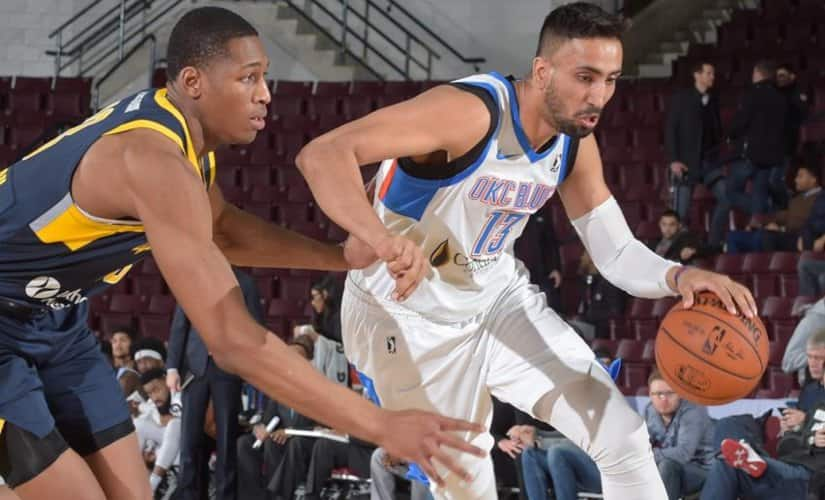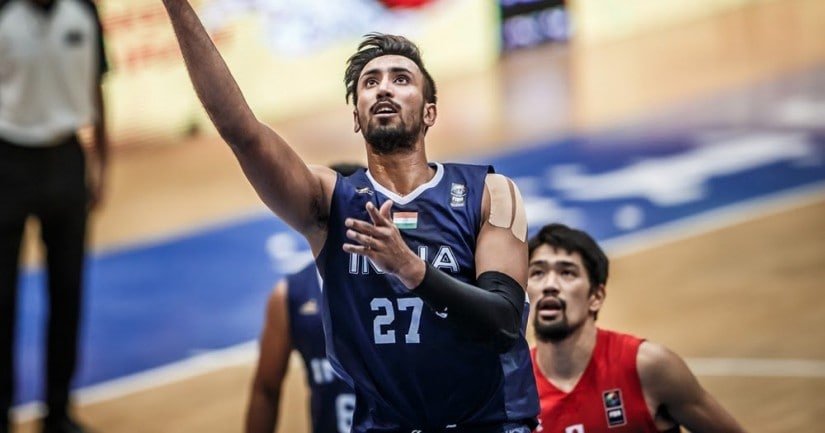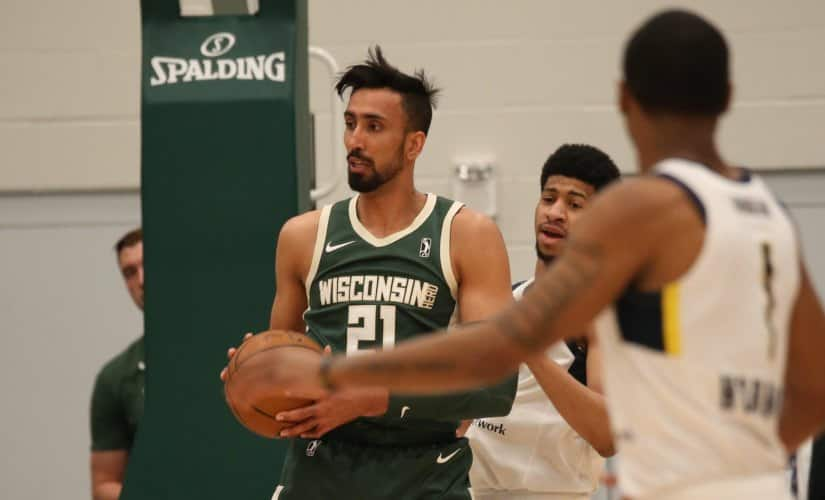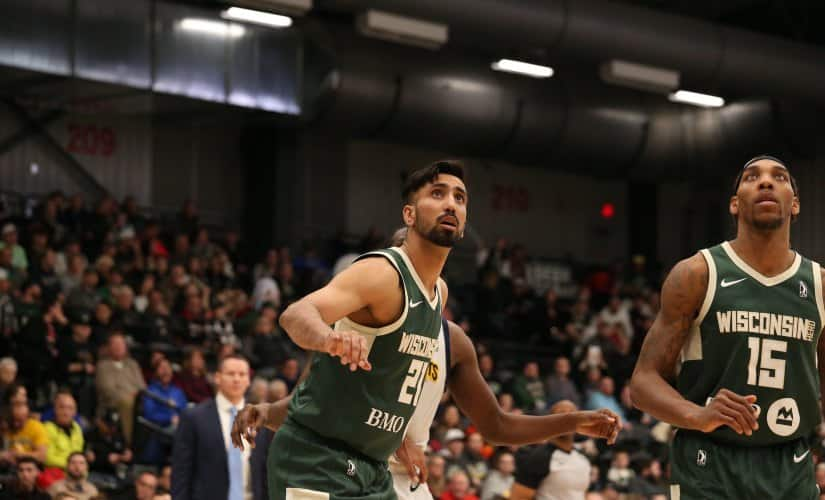Editor’s note: Professional sport is as much a scientific pursuit as it is a recreational wonder. What appears routinely mundane is a result of the hours spent honing the craft and deciphering the body mechanics till it becomes a monotonous muscle memory. In Firstpost Masterclass , our latest weekly series, we look at precisely these aspects that make sport a far more intriguing act than we know. Satnam Singh may be the most recognisable basketball player from India, but Amjyot Singh Gill can proudly claim to be one of the best that this country has ever produced. While Satnam has had the limelight on him, Amjyot has been consistently creating history in the background. A former national basketball champion, Amjyot became the first Indian men’s player (along with India teammate Amritpal Singh) to play in a professional basketball league outside of India in 2015 after he signed for Tokyo Excellence in the Japanese D-league followed by a stint in the country’s BJ Summer League. He then went on to play in the NBA G-League after he was drafted by OKC Blue in 2017 and has also played for Wisconsin Herd in the league. He is the second Indian after Satnam to play in the US League. Amjyot has also been highly successful in the 3x3 version of the sport, basketball’s newest format, gaining repute at international level with Japanese side Hamamatsu. He has also been making India proud in the FIBA Asian events. It was he who was the engine behind India beating China for the first time in 2014 FIBA Asia Cup. Amjyot was India’s highest scorer in that match. The Ludhiana Basketball Academy product plays as a power forward and is known for his scoring ability. In this edition of Firstpost Masterclass, Amjyot breaks down basketball for us, explains how top cagers hone their skills, shares his experience of playing in US and Japan, reveals the key to success in 3x3 basketball and, most importantly, talks about how young Indian aspirants could make it big in basketball. Basketball is a hugely popular sport in the West, but it doesn’t enjoy the same status in India. So how did you take a liking to the sport? I used to play cricket till 2006-07, but then I suffered a back injury. I used to go to a ground for rehab, the same ground where my father used to play basketball and there I took a liking for the sport. I was also pretty tall, so I started playing for the school team and that’s how my basketball journey started. How did your professional career in basketball start, playing outside India? We used to play in different Asian countries (for FIBA events), so there’s this person, Rohit Bakshi, who gave me an opportunity to play in Japan. He had seen my videos and then he got me an agent in Japan and from there on I got the opportunity to play professional 5x5 basketball. From what age did you start playing the sport? I was 16 years old, I was in my ninth standard in school when I started playing basketball. [caption id=“attachment_8482651” align=“alignnone” width=“825”]  Amjyot Singh Gill (R) is only the second Indian to play in NBA G-League after Satnam Singh. Image: Amjyot Singh Gill[/caption] How crucial a factor is age in basketball? Does it make a difference when you start early, like at the age of 12-13 or can you still achieve a lot of success despite starting late, like you did at the age of 16? Age (at which you start playing) plays a big role. I got less opportunities as I started at the age of 16. I played in NBA (G-league) at the age of 24. Had I started at 12-13, I could have reached that stage at the age of 18. I would have had more opportunities because they give more chances to youngsters in the US. By the time I got to know about those opportunities, it was already too late. I could have played in colleges in the US. When I was at the Ludhiana Basketball Academy, I thought it was a great achievement but had I started playing the sport at a much earlier age, I could have played in the US. There are many disadvantages of starting late. You should start playing early. What impact does the age at which you start playing basketball have on skill development? When you compare stating early against taking up the sport a bit late. This is what I was trying to point out. As I started late, I reached the skill levels required to play in NBA (G-league) by the age of 24. Had I started early, my basics would have been much more clear, my skill level would have been much higher. It’s difficult to learn when you start late because playing basketball has many small elements attached to it like how to dribble, what should be the body posture etc. It was a major disadvantage that I started late. It is an accepted fact that you need to be extremely tall and well-built to be a good basketball player. But can short players also do very well in the sport? How? (Your success) Depends on your hard work. A tall frame is not a guarantee for success. Tall players are not always the best players. Your hard work is important, height is not everything. Height gives you a certain advantage as in you can play as centre or power forward, but there are a lot of advantages for shorter players as well, such as they can be point guard or shooting guard because they are quick and agile. Your hard work will determine how successful you get. We know that star player Stephen Curry is only 6'2". What are the must-have skills for shorter players to do well in basketball? Stephen Curry’s shooting is amazing. Shorter players need to hone one particular skill to stand out from the rest. It happens with every athlete, like if you are tall and you can shoot from outside the three-point line then it gives you an advantage. So you need to hone a particular talent that makes you a better player than others. Can you explain the five positions in basketball, their roles and how it’s assigned to a particular player? A point guard is the player who starts the move, brings the ball (forward). He needs to be vocal and a point guard is seen as a leader. He needs to set up the game, instruct about a move that the team would be planning to make. Then there’s a shooting guard, whose job is to find the opportunities to shoot and make the shot. There’s a role called small forward who is generally a good defender, their role is mostly to create opportunities for his teammates. A power forward is a player who can play inside the three-point line and outside it as well. I play as a small forward or power forward. The final position is post (center). All the positions have different roles and advantages. Post generally stays close to the ring. He takes the hook shot, looks after finishing, rebounding etc. What’s your training routine like? I am currently with Punjab Police in Jalandhar. Here we have training in morning from 6 to 9 am. To enhance our stamina, we mostly do cardio exercises like track, stair workouts, ground work like circle training. We have a set schedule. In the evening from 5 to 7 pm we mostly work on our on-court skills like dribbling, shooting and then we play games in the night. In between, I spend some time in the gym. This (gymming) I started doing only four-five years back when I started playing in professional league, there I got to know that this is also important. The idea is to enhance my strength. This is my regular training routine, however, I have not been able to do all of this during the lockdown. [caption id=“attachment_4294863” align=“alignnone” width=“825”]  Amjyot Singh Gill was the top scorer when India defeated China for first time in 2014. Image: Twitter/@okcblue[/caption] What changes in training when you are in US or Japan? We only trained once in a day when I was playing in G-league, so we used to reach the training ground by 8.30 am after which we were served breakfast. We started with strength training in the gym and after that there was a video session of 30 minutes where they showed us our mistakes from the previous day or the coaches would give us instructions. After this, there would be an individual practice session of 30-40 minutes to improve your craft, like if you are a shooter then they will give you shooting drills followed by team practice (game) of two halves, one half would be about offence, the other about defence. Then each session would be two-and-half-hour-long or one-and-half-hour-long. After this, we would have our lunch and go home. On matchdays, we would have a 45-minute session (before the match), a walk through on what we have to do, they would give us information about our opponents. My training regime in Japan was almost the same. While doing strength training, which areas of your body do you focus on? Which exercises do you do in the gym? Mostly we do dead lifts, squats, lunges, hip thrusts, as the focus is more on lower body. For upper body, we do bench press, shoulder and back exercises, pull ups, body weight exercises, and pull ups with weighted jacket. This is what we do mostly. We focus a lot on core also to improve our stability. There are some basic skills in basketball like dribbling, shooting that players work on from the start but they develop a certain expertise in these skills after reaching a certain level. So what do professional players do to get better in their game, what are the changes in those skills training or does the basic skills training remain the same throughout? Basic skills training would continue always, but with some variations. What I do is if I am working on my shooting then I decide that I will not stop till I convert seven out of my 10 shots. When I start making seven shots then the target becomes eight, then nine. One or two shots you will always miss but there were players in the US who converted all of their 10 shots. So you have to bring in such variations. If you are dribbling then you have to make it more difficult, like dribbling with two balls at a same time. The need is to concentrate on what you are not good at. Also you keep increasing the difficulty level. Game awareness is a thing that usually sets apart a great player from a normal one. Can this game awareness be taught? Or how can you develop your game awareness? When you don’t play a lot your IQ (game awareness) won’t improve and if you don’t play with better players then you won’t come to know about your boundaries, you won’t think about developing. In India, mostly you play for Punjab, Tamil Nadu or ONGC, but till you don’t play outside in bigger tournaments, you won’t improve. When you play in international tournaments then your IQ (game awareness) will improve. In the foreign leagues that you have played in, what did other players do to have sharp game awareness or to improve co-ordination with teammates? Players with a specific talent only reach the top, so there are players who never score a point but they make 20 assists or they would have zero points or assists but 20 rebounds. It’s important to become an expert on a particular craft and then you reach to the top. Basketball is an extremely physical sport but what role does mental aspect play in the sport? I would say the role of physical and mental aspect is 50-50 in basketball. Basketball is the second fastest sport in the world and every two seconds there’s some change in a game, so you need to be mentally very strong to adapt to the changes. I think mental aspect plays a major role in the sport. Every athlete needs to work on this. To get to the highest level (to get recognition) you will only have few seconds and you need to perform in those few seconds. How does a professional basketball player work on mental skills? Mostly you need to keep positive vibes around yourself, talk to people who are close to you and people who help you improve your game like seniors who can tell you it’s (a setback) nothing and that you develop day-by-day. You need to also have a mentality that you are open to learning, doesn’t matter from whom. Team must always be above yourself, whatever must be happening in your normal life but you need to keep the team above all of that. [caption id=“attachment_8482681” align=“alignnone” width=“825”]  Amjyot Singh Gill plays as a power forward. Image: Twitter/@gill-amjyot[/caption] What are the most common injuries to a basketball player? How can one work on his rehab in a better way to bounce back again? It’s very difficult to avoid injuries because you don’t know what is going to happen in a game but to overcome it you need to work on strength and conditioning, you need to work on your stability a lot. Basketball players suffer a lot of ACL (anterior cruciate ligament) and knee injuries, so if you make a comeback after a proper rehab, strength and conditioning then can be better than before. You have to work on strengthening your core. Being a good player and a good team player are two different things. Many times sides with a couple of superstars also fail to do well if they are not a good team but a unit with a good understanding ends up doing well despite not having the best of the players. How can you work towards becoming a better team player? To achieve this (strong team bonding) the federation, coaches, players need to be on the same page. Everyone is important in such a process because all the players work hard, they all want to reach the next level. But you need everything to work together. When Scott Fleming was (India) coach we witnessed this first hand, he handled the team very well, federation also supported us a lot. We were based out of Jaypee Greens (which is now the venue of NBA India Academy) which has very good facilities, coach was also good, so team does well automatically when you get all the facilities. When you were in US or Japan, what sort of analysis did you come across about opposite teams and how did it impact the training? We are informed before the match about the individual players that we are going to guard, things like what they are good and weak at. Our opposition players are also fed the same information. So that we know about the movements of our oppositions players. This happens through video analysis and we are also given a note on them which has all the details about all the players. They inform about all this in the morning. Does your training change on the basis of the information that is given to you about opposition players? When you turn professional then you have a certain level of IQ that you know what you will have to do. They are paying you so much money for the same. You get the information in the morning and then you prepare for it accordingly. You have done very well in 3x3 basketball also, which is also part of Tokyo Olympics. Apart from the obvious difference from 5x5 basketball, can you explain how 3x3 basketball is different from the traditional format in terms of pace, and technique? (The 3x3 format is a smaller version of regular basketball and has gained a lot of popularity in the recent years. In 3x3, a game is played on a half court with one basket with each team consisting of four players but only three being allowed on the court at once, with one substitute. The match will have one time period of 10 minutes. There’s a shot-clock of 12 seconds and the game will stop during dead ball situations and free throws. The first team to score 21 points or more after 10 minutes get over wins) 3x3 is more intense because there aren’t as many timeouts as in a normal game and you get exhausted in those 10 minutes as compared to 5x5 game where you can rest in the timeouts or when a team is making a move. 3x3 is very rough and more intense, you hardly get fouls in this format until and unless you are shooting. You need more strength and higher stability as compared to 5x5 basketball. [caption id=“attachment_8482721” align=“alignnone” width=“825”]  After OKC Blue, Amjyot Singh Gill (L) played for NBA G-League side Wisconsin Herd. Image: Twitter/@gill-amjyot[/caption] What changes will a regular basketball player need to bring into himself or his game to do well in 3x3 basketball? Most importantly, he needs to be a good defensive and offensive player at the same time because he would have to guard short players. 3x3 doesn’t have positions so there will be mismatches and it’s very fast, so you need to think on your feet. You will need to change your mentality for 3x3, in a normal game we can do set plays but in 3x3 the shot-clock is also much shorter, so many things in your game will have to change. You play as a power forward in a normal basketball game but how does your role change in a 3x3 match? It was very difficult for me as well in the beginning because I had to guard small players, you have to dribble on a smaller court and you also have to avoid from having the ball stolen. So it’s a game of wits. When a shorter player is guarding me then I go to the post and if the player is taller then I try to execute an effective screen (a technique to block a defensive player from guarding your offensive partner). If the player is similar to my built then I try to create a mismatch (a scenario where the attacking player has an advantage over a defensive player). So, it’s a game of quick thinking, the more you play, the better you get at it. Coming to regular basketball, one of the biggest questions that Indian fans generally ask is why an Indian player has not managed to make a mark in the NBA so far. What’s your opinion on this? Is there an issue at the skill level or there’s some mental challenge? Most of the Indian players don’t have their basics (skills) clear. They don’t start playing at the right age and then suddenly at the senior level there’s such a high jump in the competition level. We don’t have a proper system, for that matter, US has a proper structure in place. They have a system which comes right through the school, players keep improving as they move forward and then they eventually become pretty good. So if we get such a structure in India then we will also benefit, if we concentrate at the junior level and give them more opportunities. NBA India is doing good work on this front, they are sending kids to play in American universities and giving them good training in India as well. I think our future in basketball could be bright if junior players get opportunities to play at the highest level. As a seasoned player, what would be your advice to budding athletes, as in when should they start taking up the sport, what opportunities should they look at? You should start when you are 12 or 13 and must try to do good in nationals. After completing higher secondary, one must look at going to US or countries which are doing good in basketball like Canada or in Europe. Go to a university in such a country and play there, like in NCAA (National Collegiate Athletic Association is a body which organises athletic programs of many colleges and universities in US and Canada), Japan could be a good option as well. You have a well defined structure there, you have scouts there who are always on the lookout for the next star and you can always come back to represent India. But you should look to go abroad until and unless we have a professional league starting in India only. Indians are not physically gifted as their counterparts in US or Europe, do you think Indian basketball aspirants could fill that gap if they have the skills but not the height or physicality generally desired in a cager? For sure. The major disadvantage for Indians is that we don’t have the trainers like there are in US who can train you on a regular basis or can provide good opportunities to you. There are many trainers in other countries who guide you on how to get to the next level. I will definitely work on it once I am done playing because now I have a lot of contacts. I want to build bridges for players like me who didn’t know about the opportunities that are there because there are a lot of them in foreign countries. Click here to read other articles in this series.
What is it like to play in top leagues of US and Japan? How do elite basketball players train and hone their skills? How can Indian youngsters make it big in basketball? India’s ace basketball player Amjyot Singh explains all this and more in this edition of Firstpost Masterclass.
Advertisement
End of Article
Written by Ujwal Singh
Watching sports and writing about it are my favourite things in life and I try to bring you the best from the sporting world at Firstpost. see more


)

)
)
)
)
)
)
)
)



